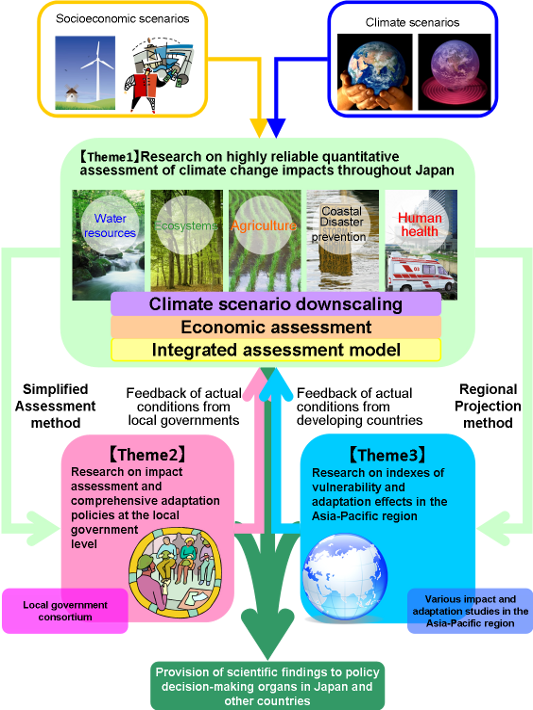Outline
1
Name of Research Project
Comprehensive Study on Impact Assessment
and Adaptation for Climate Change
and Adaptation for Climate Change
2
Name and Affiliation of Project Leader
Nobuo Mimura (Ibaraki University)
3
Research Implementation Period
FY2010-2014

4
Objectives and Outline of Research
Impacts of climate change are appearing on a widespread scale throughout the world, as shown by the numerous examples described in the Fourth Assessment Report of the Intergovernmental Panel on Climate Change (IPCC) released in 2007. The S-4 Project for Comprehensive Projection of Climate Change Impacts, a Global Environment Research Fund Strategic R&D Area Project funded by the Ministry of the Environment, Japan, which was completed in FY2009, has revealed that large impacts will also appear in key fields such as water resources, forests, agriculture, coastal zones, and human health in Japan, and that there are especially vulnerable regions for each field. Moreover, it was found that if a significant cut in global greenhouse gas (GHG) emissions is achieved, such impacts can also be expected to be reduced to a considerable extent, although even when the temperature rise is stabilized at a level of around 2°C, the occurrence of a certain amount of damage is unavoidable.
Therefore, as well as aggressive mitigation measures for climate stabilization, adaptation measures in preparation for adverse impacts from the long-term perspective are also required. Since adaptation measures differ according to the region, climate projections at the municipal level and impact projections based on them are necessary in order to formulate plans for adaptation measures. This, in turn, has created a need for research that fulfills the requirements arising from such new policies.
The objective of the S-8 Project is to promote research in response to the new tasks described above concerning measures to cope with climate change. Firstly, this will involve the development of an advanced impact/adaptation assessment model (bottom-up model) to obtain a more detailed understanding of the physical and economic impacts by field as well as estimations of the effects of implementing adaptation measures, targeted at Japan. Concurrently, a nationwide top-down impact projection model will be developed, and used together with the bottom-up model to further refine nationwide impact assessments. Through these efforts, projections will be made regarding the extent to which future impact risks will be reduced by the implementation of adaptation measures. Secondly, monitoring methods at the prefectural and municipal levels will be developed in order to grasp climate change impacts at the prefectural level. Furthermore, by developing an impact projection method that can readily be used at the regional level, and a method for visualizing the results of projections, support for the formulation of adaptation measures in individual regions will become possible. Thirdly, based on the results of the research in Japan, in order to analyze the order of priority and cost-effectiveness of implementing adaptation measures elsewhere in the Asia-Pacific region, indexes for the assessment of vulnerability, impacts, and adaptation effects that are applicable to developing countries will be developed and standardized. This will contribute to the planning and implementation of adaptation measures in those countries, where severer impacts are expected.
The S-8 Project will serve as a foundation for the formulation of adaptation measures in Japan and assessment of the feasibility of realizing a safe and secure climate change-adaptive society. Moreover, the development of a simplified method for making quantitative impact assessments will facilitate the presentation of comprehensive policy development plans for social implementation of more concrete adaptation measures at the local government level. The assessment of vulnerability, impacts, and adaptive capacity in the developing countries is also of great importance from the standpoint of contributing to international society. This project will strive to realize these aims by gathering researchers in a wide range of related fields in Japan and organically integrating their efforts.
The objective of the S-8 Project is to promote research in response to the new tasks described above concerning measures to cope with climate change. Firstly, this will involve the development of an advanced impact/adaptation assessment model (bottom-up model) to obtain a more detailed understanding of the physical and economic impacts by field as well as estimations of the effects of implementing adaptation measures, targeted at Japan. Concurrently, a nationwide top-down impact projection model will be developed, and used together with the bottom-up model to further refine nationwide impact assessments. Through these efforts, projections will be made regarding the extent to which future impact risks will be reduced by the implementation of adaptation measures. Secondly, monitoring methods at the prefectural and municipal levels will be developed in order to grasp climate change impacts at the prefectural level. Furthermore, by developing an impact projection method that can readily be used at the regional level, and a method for visualizing the results of projections, support for the formulation of adaptation measures in individual regions will become possible. Thirdly, based on the results of the research in Japan, in order to analyze the order of priority and cost-effectiveness of implementing adaptation measures elsewhere in the Asia-Pacific region, indexes for the assessment of vulnerability, impacts, and adaptation effects that are applicable to developing countries will be developed and standardized. This will contribute to the planning and implementation of adaptation measures in those countries, where severer impacts are expected.
The S-8 Project will serve as a foundation for the formulation of adaptation measures in Japan and assessment of the feasibility of realizing a safe and secure climate change-adaptive society. Moreover, the development of a simplified method for making quantitative impact assessments will facilitate the presentation of comprehensive policy development plans for social implementation of more concrete adaptation measures at the local government level. The assessment of vulnerability, impacts, and adaptive capacity in the developing countries is also of great importance from the standpoint of contributing to international society. This project will strive to realize these aims by gathering researchers in a wide range of related fields in Japan and organically integrating their efforts.
5
Research Subjects and Implementation System
- 【Theme1】Research on highly reliable quantitative assessment of climate change impacts throughout Japan
- S-8-1(1) Research on climate change impact assessment using an integrated assessment model and adaptation policies (National Institute for Environmental Studies)
- S-8-1(2)Development of a climate change downscaler and its practical implementation (University of Tsukuba, Japan Agency for Marine-Earth Science and Technology, Hokkaido University)
- S-8-1(3)Research on assessment of climate change impacts on water resources and adaptation measures (The University of Tokyo, Tohoku University, National Institute of Public Health, Toyo University)
- S-8-1(4)Estimation of coastal disaster risks and development of nationwide risk maps (Tohoku University, Fukushima University, National Institute for Land and Infrastructure Management, Shizuoka University, The University of Tokyo)
- S-8-1(5)Quantitative assessment of impacts of climate change on natural vegetation in East Asia including Japan (Forestry and Forest Products Research Institute)
- S-8-1(6)Regional assessment of climate change impacts and adaptation measures in agriculture and food production (National Institute for Agro-Environmental Sciences, National Institute of Fruit Tree Science, Center for Environmental Science in Saitama)
- S-8-1(7)Impacts of climate change on human health – Refinement of assessment methods and creation of measures (University of Tsukuba)
- S-8-1(8)Research on assessment of climate change impacts on vector-borne infectious diseases and adaptation policies (National Institute of Infectious Diseases)
- S-8-1(9)Research on the structure of benefits and burdens of climate change adaptation policies by region and sector (Meijo University, Tohoku Bunka Gakuen University, University of Hyogo, Japan Research Institute)
- 【Theme2】Research on impact assessment and comprehensive adaptation policies at the local government level
- S-8-2(1)Research on comprehensive assessment of climate change impacts and adaptation policies in local communities (Hosei University, Central Research Institute of Electric Power Industry, Tokyo University of Agriculture and Technology, Center for Environmental Science in Saitama, The Tokyo Metropolitan Research Institute for Environmental Protection, Kanagawa Environmental Research Center, Nagano Environmental Conservation Research Institute)
- S-8-2(2)Research on adaptation measures for water-related and landslide disasters in Kyushu as a region of advancing subtropical climate (Kyushu University)
- 【Theme3】Research on indexes of vulnerability and adaptation effects in the Asia-Pacific region
- S-8-3 Research on indexes of vulnerability and adaptation effects in the Asia-Pacific region (Ibaraki University, National Institute for Environmental Studies, Institute for Global Environmental Strategies, United Nations University)
6
Diagrammatic Depiction of Research
Contents
- Outline
Outline of project - Members
Participants in the project - Research Objectives
Details of research objectives - Research Presentation Meetings
Detailed information on symposiums and general meetings - Research Results
Detailed information on announcements of results of the project



